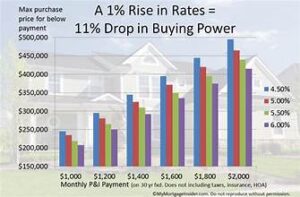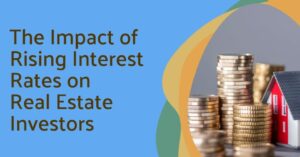
As we move through 2024, one of the most significant factors influencing the real estate market is the trend of rising interest rates. This phenomenon, driven by various economic factors, is reshaping how buyers, sellers, and investors approach real estate. Understanding these changes is crucial for anyone involved in the property market. This article provides insights into how rising interest rates are impacting real estate and what to expect in the near future.
The Impact of Rising Interest Rates on Home Buyers
1. Increased Borrowing Costs
One of the most direct effects of rising interest rates is the increase in borrowing costs. Higher rates translate to higher monthly mortgage payments, which can significantly impact a buyer’s purchasing power. For many prospective homeowners, this means either stretching their budget or reconsidering their home buying plans. According to recent data, a 1% increase in interest rates can add several hundred dollars to the monthly payment on a typical mortgage.
2. Shift in Buyer Preferences
As borrowing becomes more expensive, buyers are increasingly looking for ways to mitigate costs. This shift is leading to a preference for smaller homes or properties in less expensive areas. Additionally, there is a growing trend toward adjustable-rate mortgages (ARMs) as buyers seek lower initial rates with the hope of refinancing in the future when rates might be more favorable.
The Effect on Real Estate Investors
1. Adjusted Investment Strategies
Real estate investors are also feeling the impact of rising interest rates. Higher financing costs can reduce the profitability of investment properties, especially those with higher leverage. Investors are adapting by seeking properties that offer higher yields or by exploring alternative financing options, such as private lending or partnerships.
2. Changes in Property Valuations
With the cost of borrowing on the rise, property valuations are experiencing shifts. Higher interest rates can lead to lower property values as the pool of qualified buyers diminishes. This could create opportunities for investors to acquire properties at a discount, provided they can navigate the increased cost of capital.
Market Adjustments and Seller Strategies
1. Slower Home Sales
As interest rates rise, the real estate market may see a slowdown in home sales. Sellers may need to adjust their expectations and be prepared for longer listing periods. To attract buyers, sellers are increasingly offering incentives such as price reductions or covering closing costs.
2. Emphasis on Property Appeal
To stand out in a competitive market, sellers are focusing on enhancing the appeal of their properties. Home staging, renovations, and curb appeal improvements are becoming more common as sellers seek to make their properties more attractive to potential buyers who are more selective due to higher borrowing costs.
Forecast for 2024
1. Continued Rate Increases
Experts predict that interest rates will continue to rise throughout 2024. This trajectory is likely to further impact the real estate market, with potential effects including continued pressure on home prices and buyer affordability. The Federal Reserve’s monetary policy decisions will be a key factor in determining the pace and extent of these changes.
2. Evolving Market Dynamics
The real estate market will need to adapt to the ongoing changes. Buyers and sellers alike will need to navigate a landscape of higher borrowing costs, potentially lower property values, and shifting investment strategies. Market participants who stay informed and adaptable will be better positioned to succeed in this evolving environment.
Conclusion
The rise in interest rates is a significant factor shaping the real estate market in 2024. With increased borrowing costs, shifting buyer preferences, and adjustments in investment strategies, the landscape is changing rapidly. Buyers, sellers, and investors must stay informed and adaptable to navigate these challenges effectively. As the year progresses, staying abreast of economic trends and market forecasts will be crucial for making informed decisions in the real estate market.




